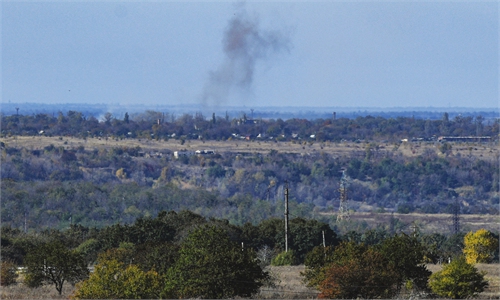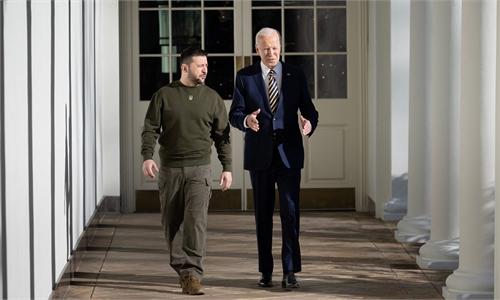
Illustration: Chen Xian/Global Times
One of the enigmatic aspects of international politics is that big and militarily superior countries have systematically lost wars in smaller countries over the last 50 years, from Vietnam to Ukraine. "Losing" here means military defeat, being forced out, losing the struggle for the hearts and minds of the people, and facing fiasco when it comes to achieving the professed noble motives like introducing human rights, democracy, freedom or liberating women. And given the tremendous human costs, particularly in the Middle East, the US' "Global War on Terror" since September 11, 2001 is also an intellectual and moral disaster.
The US - by far the world's largest military spender, interventionist, warrior, occupier, global base-builder with the most militarized foreign policy - is in a class of its own. In losing wars too.
It is now rapidly losing legitimacy, relevance and credibility in the eyes of most of the world outside US/NATO/EU/ANPO/AUKUS. Firstly, all these imperial militarist adventures have been woefully anti-intellectual and imbued with the arrogance of power, elements of racism and hubris. Secondly, after quite predictable fiascos and defeats - such as in Iraq - there comes a time when propaganda, psychological operations (PSYOPS), media influencing, and psycho-political projection no longer do the trick.
There comes a time, too, when even the biggest military spender and economy cannot finance its weapons addiction and its arsenals of weapons and ammunition dry up.
It's called over-extension and diminishing legitimacy in the eyes of others, it's called militarism to death and is transforming into imperial decline and eventual fall. No empires have lasted forever and that of the US/NATO world will be the last. No one is so foolish to believe that, in an incredibly diverse world, everybody else would accept one player to be the all-dominating system and shape others into its own image. Missionary times are a thing of the past.
Enter Ukraine. NATO set itself up in Kiev immediately after it became independent and declared in 2008 that it would become a member of the alliance. It was a gross violation of the promises indisputably given to the last Soviet President, Michael Gorbachev, but such was the unipolar we-can-do-whatever-we-want sentiment.
In an autistic manner, NATO refused to listen to Russia's legitimate security concerns and also did not bother about the fact that there was only a tiny minority among the Ukrainian people in favour of membership of NATO. Instead, a regime change in Kiev was all that was needed: installing a pro-Western leadership, paying it well and giving it an offer it could not refuse by wooing it step-by-step into the ever-expanding alliance.
Russia then put its foot down, and insult had to be added to injury: We will help you, Ukraine, for as long as it takes for you to win "our" war against Russia and "weaken" it; you'll be covered the whole way, just fight for us to the last Ukrainian.
Thus, Part One with the expansion and wooing, and Part Two with the militarization and proxy war - but no membership of NATO, which would commit NATO troops to Ukrainian soil and cost NATO lives. Now comes Part Three - the abandonment and Ukraine on desolation row to be fixed by a faltering EU.
Here, the Palestine-Israel conflict comes in handy. The political and media attention on Ukraine has diminished significantly, while Ukraine's counter-offensive has stalled, and internal conflicts in Kiev accelerate.
The NATO blame game is on: We gave you all the weapons, ammunition and training we could, but you did not manage the military struggle well; your leadership is falling apart, and you are not as grateful to us as we had expected, and so on. And do not expect NATO or EU membership in the near future (no matter what we say for the public).
Obviously, nobody wants to be associated with such a political, economic, military, legal and moral fiasco. Not the US and NATO's leaders, who, from a historical perspective, provoked it in Part One and, instead of admitting it, continued to Part Two and Three.
The EU has not been able to develop its own policies on the Ukraine conflict. It followed the US blindly, installed history's toughest sanctions and completely isolated the largest European state, Russia, from Europe. Sweden and Finland willingly let themselves be pushed into NATO for no serious reason. Then followed the destruction of the Nord Stream pipelines, the largest ever infrastructure destruction (most likely carried out by the US because President Biden and other leaders said they would do just that and because of the silence and lack of official reports explaining who did what).
Weapons depots are becoming emptied, and now, to put it crudely, the Union looks increasingly wobbly politically while undergoing its deepest ever economic crisis. Germany's economic and political situation looks bleak. The EU area is likely to also be heavily hit by the long-term repercussions of the violence in the Middle East.
The EU's helter-skelter knee-jerk reaction to Russia's military operations in Ukraine prevented any analyses of likely consequences in the short-, mid- and long-term of these measures, which were as ill-considered and irrational as they were drastic. Russia, on the other hand, will get out of this quagmire much better than the EU.
While the US is comparatively well protected from the negative consequences of its policies, its European allies are not. The burdens on the civilian economy caused by warfare, militarism, tremendous re-armament, and refugee flows - and thereby, depletion of resources urgently needed for European infrastructure, climate change measures and welfare investments - paint a dark picture of the future.
It will likely become a guns-before-butter society, and future generations will have to pay the bills.
As time goes by, people will take to the street - for themselves and/or in support of, say, the Palestinians. Simultaneously, the far right will see its dawn as the economic crisis deepens.
While the West declines and implodes - more with a whimper than with a bang - one scenario for the next decade or so may well contain the fragmentation and possible dissolution of NATO.
The author is director of the Sweden-based think tank Transnational Foundation for Peace & Future Research. opinion@globaltimes.com.cn


